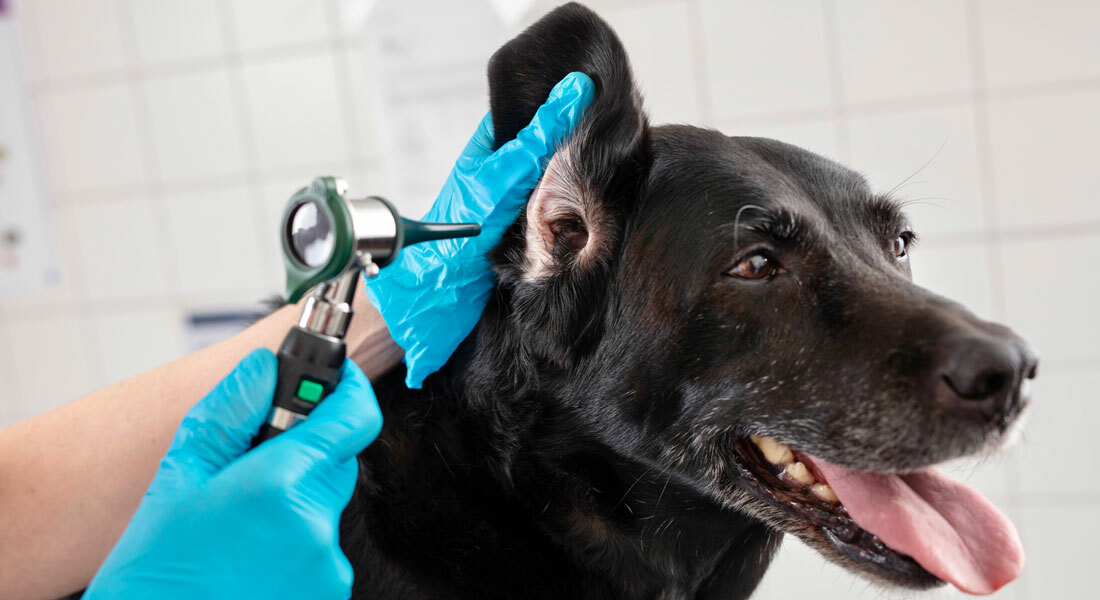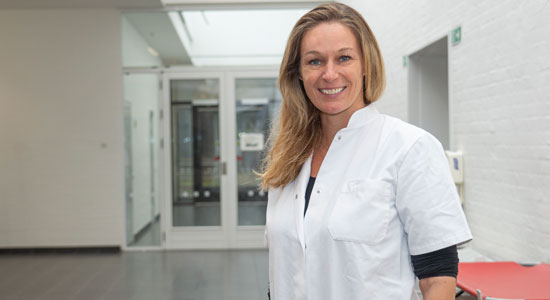Click here to read the curriculum in the course catalogue.
Course code: SCAM25045U
Applied Clinical Dermatology
This course is a part of

The purpose of this course module is to further develop the skills of the student within the discipline of veterinary dermatology in companion animals.
The level of prior knowledge and skills within clinical dermatology from both veterinary candidate level and the first part of the master-education will be developed in order to form a solid basic platform within clinical dermatology.
In theory and by practical exercises the participant can expect that professional skills and competences within the subject of clinical companion animal dermatology will be extended at an advanced basic level.
The participants’ basic knowledge, professional skills and competences within clinical dermatology will be enhanced through theoretical seminars and case-based exercises.
The participants will be encouraged to define, identify and discuss clinical methodology, including identification of clinical dermatological lesions, and paraclinical tools in systematised reflective clinical decision making in companion animal dermatology.
Read more about the specialisation tracks and the Master's programme on the main page:
Course Directors on Applied Clinical Dermatology

Mette SchjærfAssociate Professor |
Course details on Applied Clinical Dermatology
Dates and examination
Course dates 2025
10 - 14 November 2025
Course dates 2027
15 - 19 November 2027
The course is available every second year.
Examination
Please find dates and details about the exam in the exam schedule.
Learning outcomes
Knowledge
Having completed the course, the student must be able to:
- Define, identify and discuss veterinary methodology and paraclinical tools in systematised reflective clinical decision-making in companion animal clinical dermatology.
- Explain basic structure and physiology of the skin and hair and define pathophysiologic mechanisms involved in common dermatologic diseases.
- Demonstrate critical reflection on the significance of skin anatomy and physiology in the clinical approach to dermatological lesions.
- Demonstrate critical reflection with respect to further diagnostic planning to achieve a specific diagnosis of the dermatological patient.
- Discuss the fundamental prerequisites for appropriate preparation of diagnostic protocols.
- List appropriate differential diagnoses based on clinical dermatologic presentations in companion animals.
Skills
Within the area of clinical dermatology, the graduate must be able to:
- Apply methodologies such as performing clinical dermatological examination and use basic diagnostic tools for relevant dermatological cases in companion animals, especially for pruritic lesional skin and non-pruritic alopecic lesions.
- Analyze and reflect on collected data in order to discriminate between relevant dermatological differential diagnoses.
- Demonstrate systematic approach to pruritic versus non-pruritic skin diseases including the discrimination between infectious causes versus inflammatory, hypersensitivity causes for pruritus, as well as systemic (endocrine) and local causes of the hair follicle for non-pruritic alopecia.
- Make clinical decisions, arrive at a diagnosis and consider evidence based scientific approaches in order to plan and administer further appropriate diagnostics, patient therapy and management.
- Communicate effectively in writing and pass on results to relevant parties.
Competences
Following the course, the candidate must be able to:
- Evaluate companion animal diseases within clinical dermatology.
- Work independently, take responsibility for, predict, prognosticate and make decisions within clinical dermatology at an advanced basic level.
- Educate owners of chronic dermatological patients concerning long-term medical treatment and supportive long-term treatment for the skin barrier.
- Discriminate between curative and palliative treatment options in companion animal clinical dermatology.
- Independently evaluate and structure own learning processes and continuously obtain new knowledge at an advanced level within clinical dermatology.
- Use relevant scientific literature in the field of dermatology.
- Evaluate different patient types combining the above-achieved skills.
Admission criteria
You must meet the following criteria to be admitted to this course:
- Hold a degree in Veterinary Medicine
- Hold one of the following certifications
- DVA Certificate in Small Animal Diseases (equivalent to the 4 compulsory courses of the Master of Companion Animal Clinical Science)
- Swedish / Norwegian / Finnish specialist in diseases of dogs and cats
- Equivalent competences
- Have a minimum of 2 years of relevant work experience from companion animal practice
- Be proficient in English
Find detailed information about the formal requirements for this course.
Read more about admission on the main page of Master of Companion Animal Clinical Science.
Tuition fees
EU/EEA citizens*
Single course student: 33,500 DKK
Master student: 30,000 DKK
Non-EU/EEA citizens
Single course student: 37,740 DKK
Master student: 34,240 DKK
Tuition fees include course materials and lunch/coffee. Books are not included in the tuition fees and must be purchased by the participants.
*Citizens of the EU, EEA or Switzerland is entitled to a subsidised tuition fee, due to EU legislation, hence the difference in price.
Location
University of Copenhagen
University Hospital for Companion Animals
Dyrlægevej 16
1958 Frederiksberg
Denmark
Contact
Christine Gulstad
Study Administration Officer
lifelonglearning@adm.ku.dk
Tlf: +45 35 32 12 73
